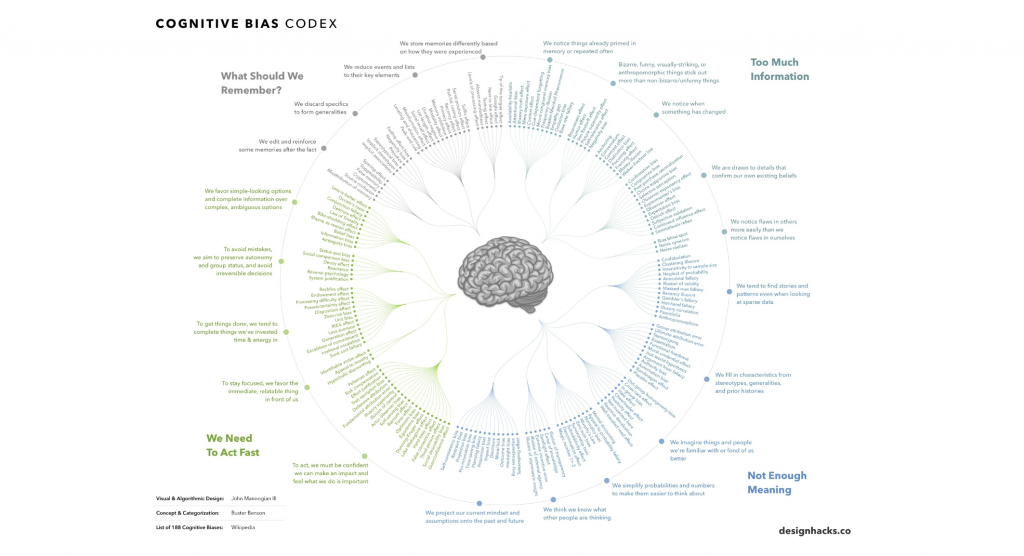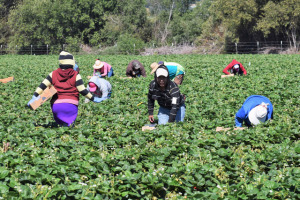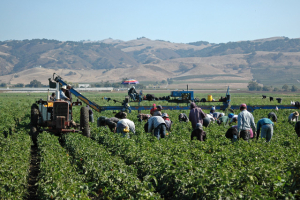
On Bias and Rationality
November 13, 2022 Roots of Change
Guest blog by Maureen McGuire, CEO, Farm Bureau of Ventura County. Published with permission.
Instead of the typical motivational poster, I have an infographic of 188 cognitive biases hanging on my office wall. At times, this is more accurately a demotivational poster. Sometimes, during a Zoom call, I can see the biases figuratively unfolding before me, and others I am pinged with some insight into how I might be falling into these well-laid traps. My hope is that this constant reminder sets a tone that influences the work and positions here at Farm Bureau of Ventura County. Ideally, our work eschews personal bias and aims to the lofty mission of the long-term sustainability of agriculture in Ventura County.
One of the strongest and most common pitfalls is confirmation bias. This is when you unconsciously accept information that confirms what you already think is true and you discard information that contradicts your beliefs. One insidious mechanism of this, is to surround yourself with like-minded folks. It feels amazing to preach to the choir. Working with organizations and individuals who share drastically different world-views can be flabbergasting at times, but the effectiveness of what we do, when it includes them, cannot be discounted. For example, the Ventura County Farmworker Health Collaborative. I was a member as a grower during COVID, and now a much more regular attendee in my role at FBVC. This group brings together growers, the VC Public Health Department, the Farm Worker Resource Program, Cal-OSHA, policy makers, and farmworker justice groups. Everyone comes together around the mutual understanding that collaborating is better for health outcomes and food supply stability, even if it takes extra open-mindedness on approaches.
I’ve observed that social and environmental organizations often benefit from the halo effect, while farmers suffer from the horns effect. Sometimes it seems that farmers can do no right and social or environmental groups can do no wrong (or in some cases the reverse). This is a strong bias to forget all the missteps on one side and remember them on the other. It makes it easy to identify your enemies and friends, but we leave out a lot of relevant information and opportunity when we create these artificial camps. I often give speeches to community organizations and university classes. I try to negotiate as much time as I can for questions and answers, because this is my opportunity to hear what assumptions the audience has about farmers and to give them some information to counteract this bias. For example, many people are unaware of the world-class air monitoring we have in the county that can put them at ease about public health issues related to pesticide drifts. People are often shocked to hear that it takes 40%-60% more land to make the same amount of product in an organic system depending on the crop, or that most growers are utilizing best management practices for water conservation when irrigating resulting in limited to no dry-weather runoff for most fields. Providing stories of innovation and successes is key to combating the horns effect for farmers, and Ventura County agriculturalists have plenty of good news to share.
There is a moment in my speech I give at public events where I list out many of the challenges farmers are facing: water, labor, succession planning and talent retention, pests, logistics and supply chain challenges, land use changes, rural-urban interface conflicts, marketing and consumer trends, and climate change. I offer one solution to the audience; the long history of farms as learning organizations with systematic problem solving and experimentation. The industry innovated from the horse to the Frick Farm Machine in 1876, essentially a steam powered tractor. Now we are anticipating robotics, artificial intelligence, and machine learning. The more flexible we can be as an industry, the more resilient to uncertainty we will be.
At the root of challenging cognitive biases is the ability to change one’s mind. There is a reason there are over 188 cognitive biases. Maintaining plasticity of view is tiring because you are left in a constant state of un-knowing with no way to easily sort information. One way to inject rationality, and challenge bias, is to invert the question. Rather than asking what information I have, ask what information do I need? What do we need to learn? There is uncertainty in every proposed solution to agricultural challenges, from shifting market trends to water supply to climate change. I certainly don’t have the answer to those challenges, but I’m interested in learning alongside growers and building pathways based on rational thought and critical thinking, and hopefully I’ll overcome the Dunning-Kruger effect.
Image origin: Wikipedia. Designed by John Manoogian III (jm3). Categories and descriptions originally by Buster Benson.
https://creativecommons.org/licenses/by-sa/4.0/
Cognitive Bias, confirmation bias, halo effect, horn effect, Maureen McGuire, Ventura Farm Bureau



